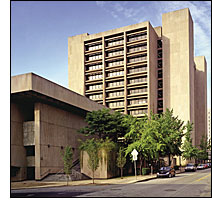Big Renovations Are Planned for Benedum Hall
Transformation plan to begin in 2008
 The Michael L. Benedum Hall of Engineering will undergo a major transformation over the next few years.
The Michael L. Benedum Hall of Engineering will undergo a major transformation over the next few years.
Formally dedicated in 1971, Benedum Hall has had periodic classroom and laboratory upgrades. In 2006, the school began planning for a complete renovation of the entire building and the construction of an additional building. The University is committing approximately $60 million toward the transformation plan, and an additional $30 million will be raised in private support. The plan will be carried out in two major phases.
Phase one begins in spring 2008 with the most visible external feature of the overall plan—the construction of a new building connecting the Benedum Hall tower to the auditorium building across the plaza. This entire two-story structure and the second floor of the tower will be dedicated to the Mascaro Sustainability Initiative (MSI), Pitt’s center for sustainable design and engineering. Reconstruction of the auditorium interior will begin in summer 2008 with the current 500-seat open space converted into five individual classrooms.
A new mezzanine will be constructed in the tower’s sub-basement level in late 2008, creating an entirely new floor. By early 2009, construction will begin on the complete restructuring of the tower’s basement level into a new Lower Plaza Level with 10 new classrooms, a new home for the Bevier Engineering Library, a café, offices for student organizations and clubs, and a 3,600-square-foot student computer lab.
In mid-2009, the first floor of Benedum Hall tower will be transformed into the school’s new administrative center, housing the dean’s office, freshman programs, academic affairs, and the offices of diversity, research, and development and alumni relations. By early 2010, construction will begin on the restructuring of the fourth and fifth floors, with one becoming a complex of research labs and offices dedicated to bioengineering research, and the other devoted to nanoengineering.
The second phase, to commence after 2010, involves the renovation of the tower floors 6 through 12, which house the school’s academic departments.
Other Stories From This Issue
On the Freedom Road

Follow a group of Pitt students on the Returning to the Roots of Civil Rights bus tour, a nine-day, 2,300-mile journey crisscrossing five states.
Day 1: The Awakening
Day 2: Deep Impressions
Day 3: Music, Montgomery, and More
Day 4: Looking Back, Looking Forward
Day 5: Learning to Remember
Day 6: The Mountaintop
Day 7: Slavery and Beyond
Day 8: Lessons to Bring Home
Day 9: Final Lessons

